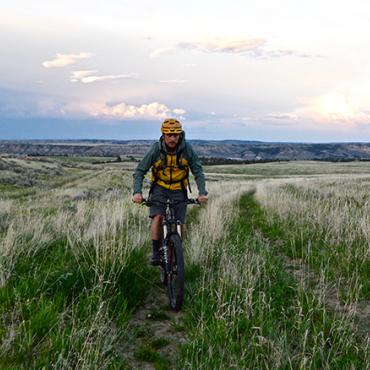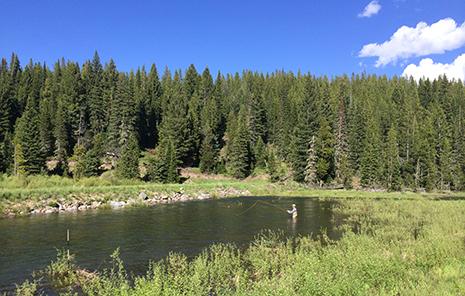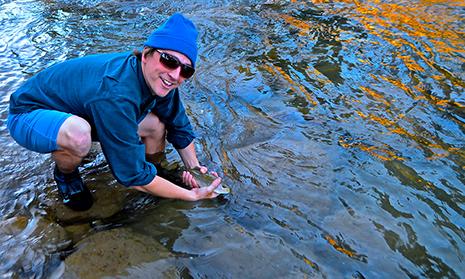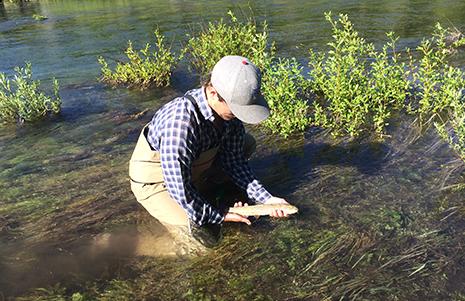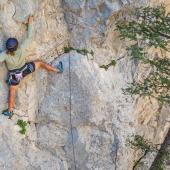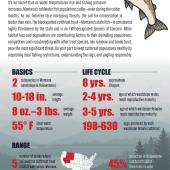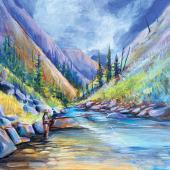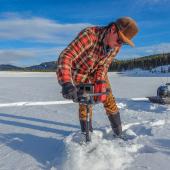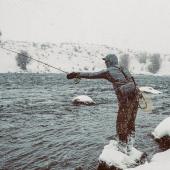Angle On
Fishing advice for beginners, part I.
Learning to fly fish in Montana is as intimidating as asking a girl to dance at your 6th-grade mixer. Most likely, at first pass, you’ll be met with shame, embarrassment, and even bodily injury. But there’s also the possibility, however remote, of success. That slim margin for success is what brought me to a mountain stream on a recent June day to try my hand at the most Montanan of outdoor pursuits: tricking a fish into eating a fake bug. Here’s what I learned.
1. Simplify your gear. Gear is tricky in any new sport. Lingo replaces common words and phrases, further complicating an already esoteric learning process. To keep things as simple as possible, I opted for a starter combo setup. The Topo Outfit from Redington did the trick and didn’t break the bank at only $220. It includes a rod, reel, line, tippet, leader, and six common flies. It also comes with handy knot-tying diagrams for the basic starter knots. The Topo Outfit got me on the water without the headache and added pressure of going to a shop and blindly moving amongst the endless racks. I also bought the simplest waders I could find, the Sonic-Pro Ultra Packables also from Redington, and subbed in beat-up old hikers for pricey wading boots. My waders have one pocket and can be packed up into that pocket for easy transport. This also makes them great for backpacking trips to alpine lakes, as they take up way less room in your pack.
2. Ask questions. Fly fishing is ubiquitous in southwest Montana. Beers are named after fish, rivers are as sacred as temples, and towns exist solely to service visiting anglers. This leads people to assume that if you live here, you must know everything there is to know about fly fishing. Or even a little bit. Maybe something. Which isn't necessarily unreasonable, as we often glean insights from observation. But the best way to learn is to ask questions, no matter how stupid you might feel doing it. Luckily, I’m used to feeling stupid, and this comes easily. You’re better off asking the question once, early on in the process, and truly learning what it is that you’re doing out there in the middle of the river, surrounded by mosquitoes, sunburned beyond recognition, and still without any fish in your creel. It might seem annoying at first, but for the most part, people like to share their “expertise” and they’d rather have you ask early and know what you’re doing by mid-summer than still be clueless come fall.
3. Get a good coach. People and their expertise brings me to my next point. Go fishing with someone who is 1) a good fisherman and 2) a good teacher. This means patient, enthusiastic, and encouraging, but also direct and honest. It will do you no good to go with someone who is constantly encouraging and still tying your knots after the tenth outing. Find someone who will increase your chances of catching fish, but will also ensure you’re learning the sport for yourself. The goal is independence. My coach spent time going over basics, but also let me make my own mistakes. Discussing what worked and what didn’t on the riverbank over beers is another great teaching tool.
4. Take it seriously. This doesn’t mean get down on yourself if you don’t catch fish, or scream at your coach if things keep going wrong. It means study, prepare, practice, and repeat. Fishing is cerebral, sometimes too much so, but cerebral nonetheless. It takes patience and it takes knowledge. Follow the fishing report, track streamflows, read fly-tying books, and pick the brains of other anglers. Develop your body of knowledge and you’ll start to see better results on the river.
5. End on a high note. If you get home and you’re pissed off, you won’t want to go back to the river, and you won’t become a better fly fisherman. If the fishing’s been slow but you finally bring one to hand, call it quits. You’ll remember the feeling of catching fish, not the frustration of striking out. If the fish aren’t biting at all, pack up the gear and drink a river-side beer. Take in the scenery and remind yourself why you live in Montana.
I’ve only been fishing for a few short months, so an advice column might be premature. Having said that, I’ve only been fishing for a few short months, so an advice column for beginner anglers by a beginner angler seems appropriate. As I continue to fish, and hopefully improve, I'll look back at this list. I imagine all of the advice herein will still apply.

